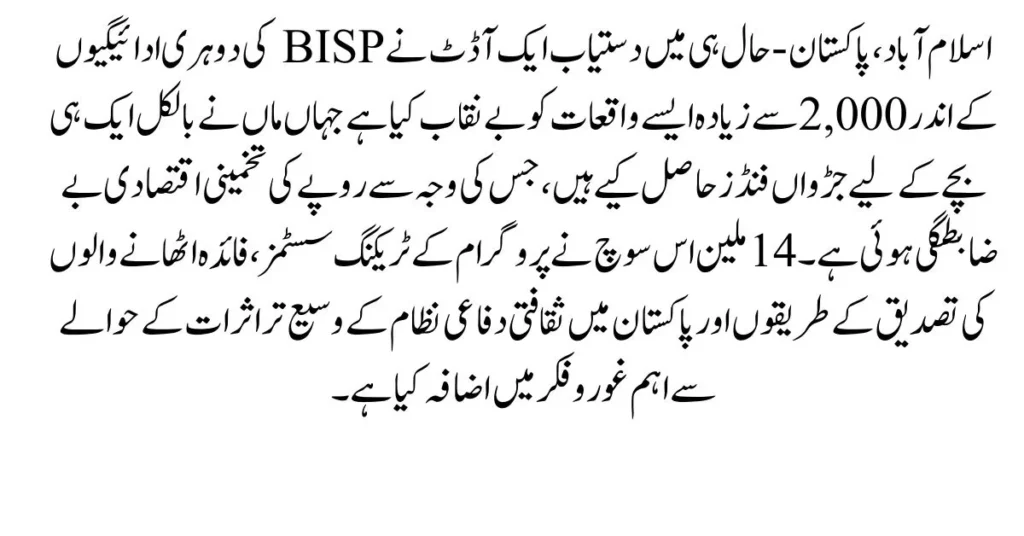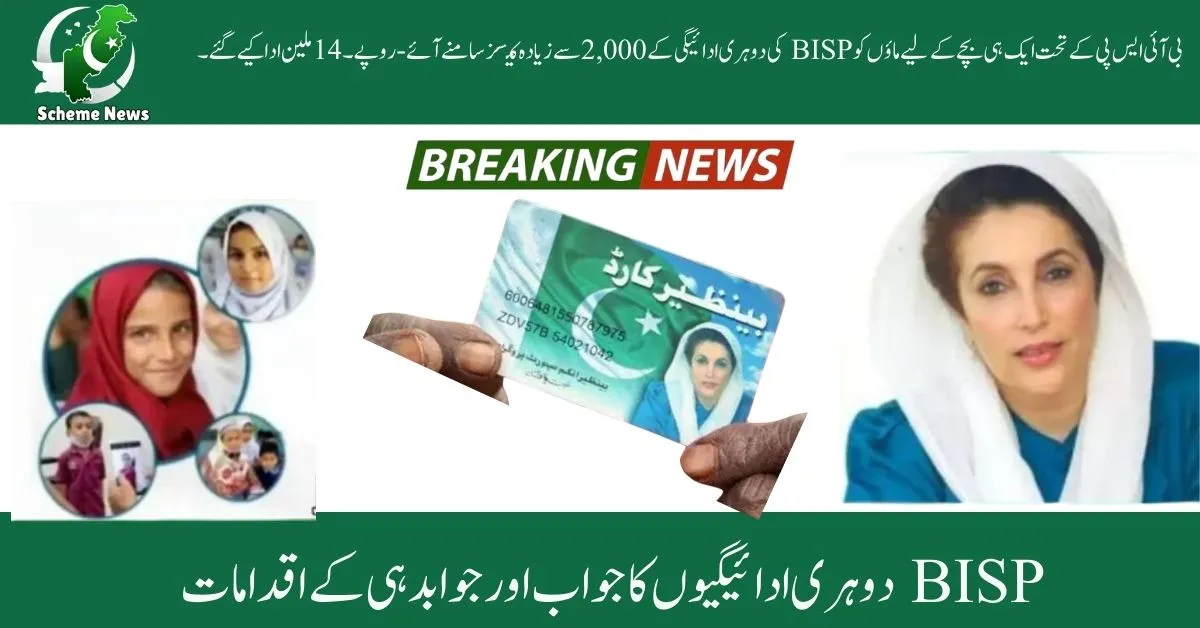Islamabad, Pakistan – A recently available audit has exposed over 2,000 instances within BISP Dual Payments wherever moms acquired twin funds for exactly the same kid, leading to an projected economic irregularity amounting to Rs. 14 million. The thought has increased significant considerations in regards to the program’s tracking systems, beneficiary verification methods, and the broader implications for cultural defense systems in Pakistan.

Read more: Complete Procedure to Apply for Prime Minister Laptop Scheme Phase 4
The Nature of the Irregularities of BISP Dual Payments
In accordance with an official research done by the Auditor Standard of Pakistan (AGP), these twin obligations were created beneath the Benazir Taleemi Wazaif initiative—an academic stipend plan introduced to inspire school enrollment and attendance among children from low-income families. The BISP Dual Payments offers conditional income transfers to moms whose young ones attend college regularly.
But, in around 2,000 recorded situations, several mom acquired stipends for exactly the same child. In some cases, equally scientific mothers and caregivers—or in uncommon instances, next spouses—were found to be concurrently claiming benefits using modifications of the child’s title or identification data. That factors to glaring weaknesses in beneficiary personality proof and digital integration across the of BISP Dual Payments program’s administrative framework.
The combined obligations were tracked through the National Socio-Economic Registry (NSER) and proved by cross-referencing family identification figures with college enrollment knowledge and biometric information.
BISP Dual Payments Response and Accountability Measures
The BISP Dual Payments administration has accepted the issue and caused remedial measures. In a press statement, a senior BISP official claimed, “We are working with NADRA and relevant academic institutions to tighten evidence protocols and assure such lapses do not arise again. Internal audits have already been increased, and disbursements are now being examined for all recognized beneficiaries.”
The state more observed that the majority of these errors seem to own stemmed from knowledge duplication and outdated household records, as opposed to deliberate fraud. However, investigations are continuous to spot if any beneficiaries or facilitators employed in willful misconduct.
Return and healing techniques have also started in several districts, with Rs. 2.3 million previously restored through voluntary returns or deductions from future payments.
Read more: Complete Procedure to Apply for Prime Minister Laptop Scheme Phase 4
BISP Dual Payments Systemic Weaknesses Highlighted
That incident sheds gentle on longstanding architectural issues within Pakistan’s cultural welfare disbursement systems:
Lack of Real-Time Information Synchronization
The BISP Dual Payments dependence on periodic updates from schools and area practices leaves room for obsolete or inaccurate data to persist.
Weak Personality Evidence Regulates
The disappointment to discover numerous statements for the same kid till post-payment auditing reveals inefficiencies in pre-disbursement checks.
Handbook Interventions and Record-Keeping
Despite a national shift toward electronic governance, several field files in rural areas stay handbook or semi-digitized, complicating oversight efforts.
Authorities have called for greater integration between BISP, NADRA, and the Training Administration Data System (EMIS) allow real-time information corresponding and improved scam detection.
Implications for Future Policy of BISP Dual Payments
The combined cost anomaly gift ideas a cautionary story for the government as it tries to expand the scope and protection of social security nets. With around 9 million people listed below BISP and connected initiatives, also slight inefficiencies or misuse can lead to significant financial loss and decreased rely upon government programs.
This situation has additionally prompted calls for the following reforms:
- Biometric confirmation at school level to validate child attendance and prevent fake claims.
- Integration of AI and equipment understanding for anomaly recognition across beneficiary datasets.
- Public visibility dashboards showing disbursement summaries by area and category.
Civil society companies and progress companions, such as the Earth Bank, have advised the government to strengthen audit elements while continuing to ensure genuine beneficiaries aren’t adversely impacted by overly firm controls.
FAQs
Q1: What’s the Benazir Income Support Process (BISP)?
A: BISP is Pakistan’s flagship social security net, introduced in 2008, to supply financial assist with low-income families. It offers conditional income transfer applications like the Benazir Taleemi Wazaif to support education.
Q2: How were the double payments discovered?
A: The Auditor Standard of Pakistan (AGP) found the matter throughout a routine audit by cross-checking BISP disbursement records with the NSER and NADRA databases.
Q3: May moms who acquired dual payments face appropriate consequences?
A: Typically, if the duplication was unintentional, beneficiaries may only be necessary to refund the extra amount. Nevertheless, strategic scam may result in appropriate action.
Conclusion
The exposure of over 2,000 twin payment cases underneath the Benazir Money Help System scars a crucial point for Pakistan’s cultural security landscape. Whilst the financial lack of Rs. 14 million is somewhat small in the context of the program’s https://bisp.gov.pk national budget, the implications for policy integrity and community trust are significant. Moving forward, it’s crucial that the federal government promotes information integration, audit abilities, and accountability methods to safeguard the welfare of the country’s many susceptible populations. A clear and highly sturdy program is no longer optional—it’s essential.





